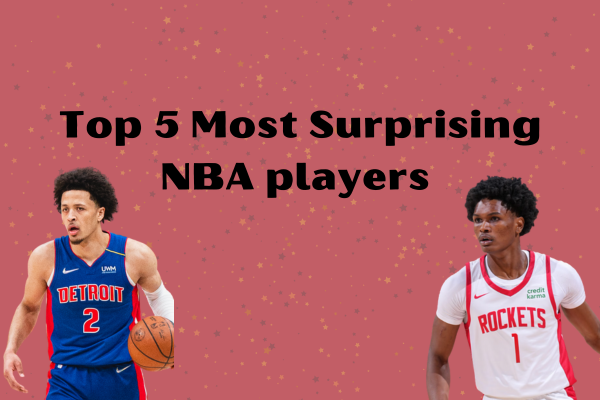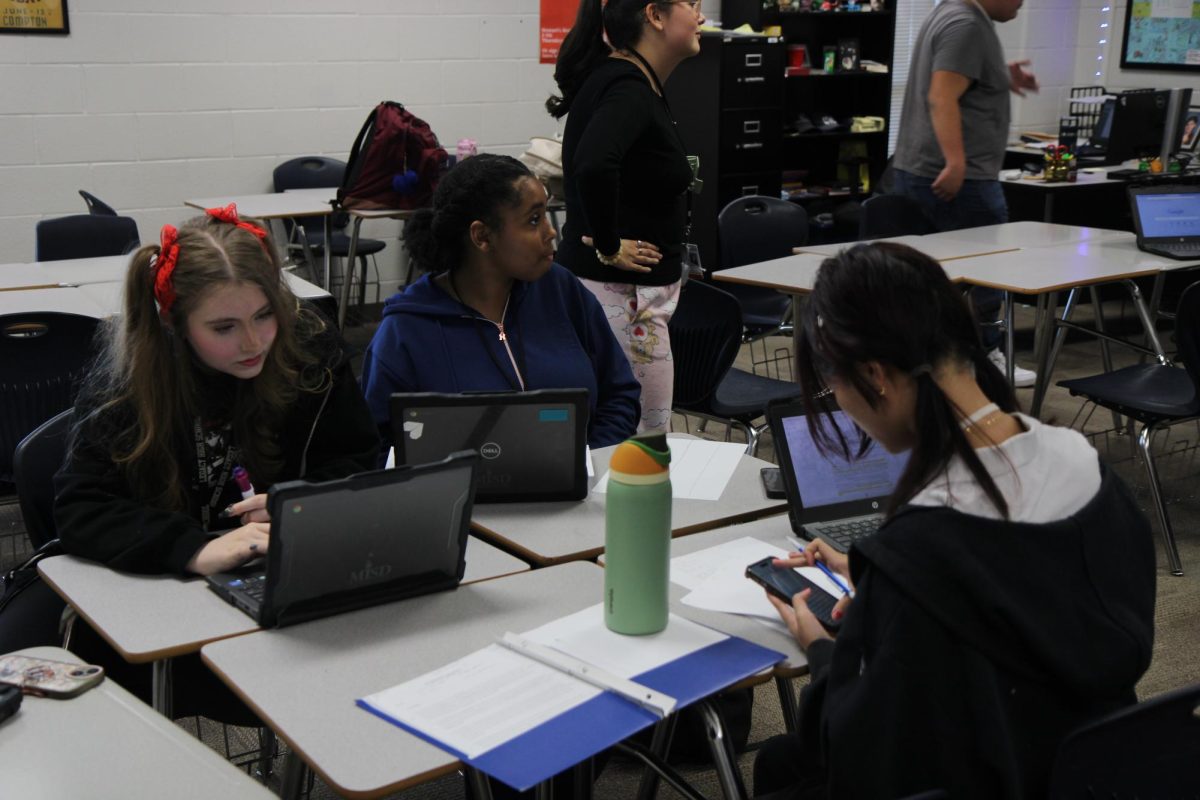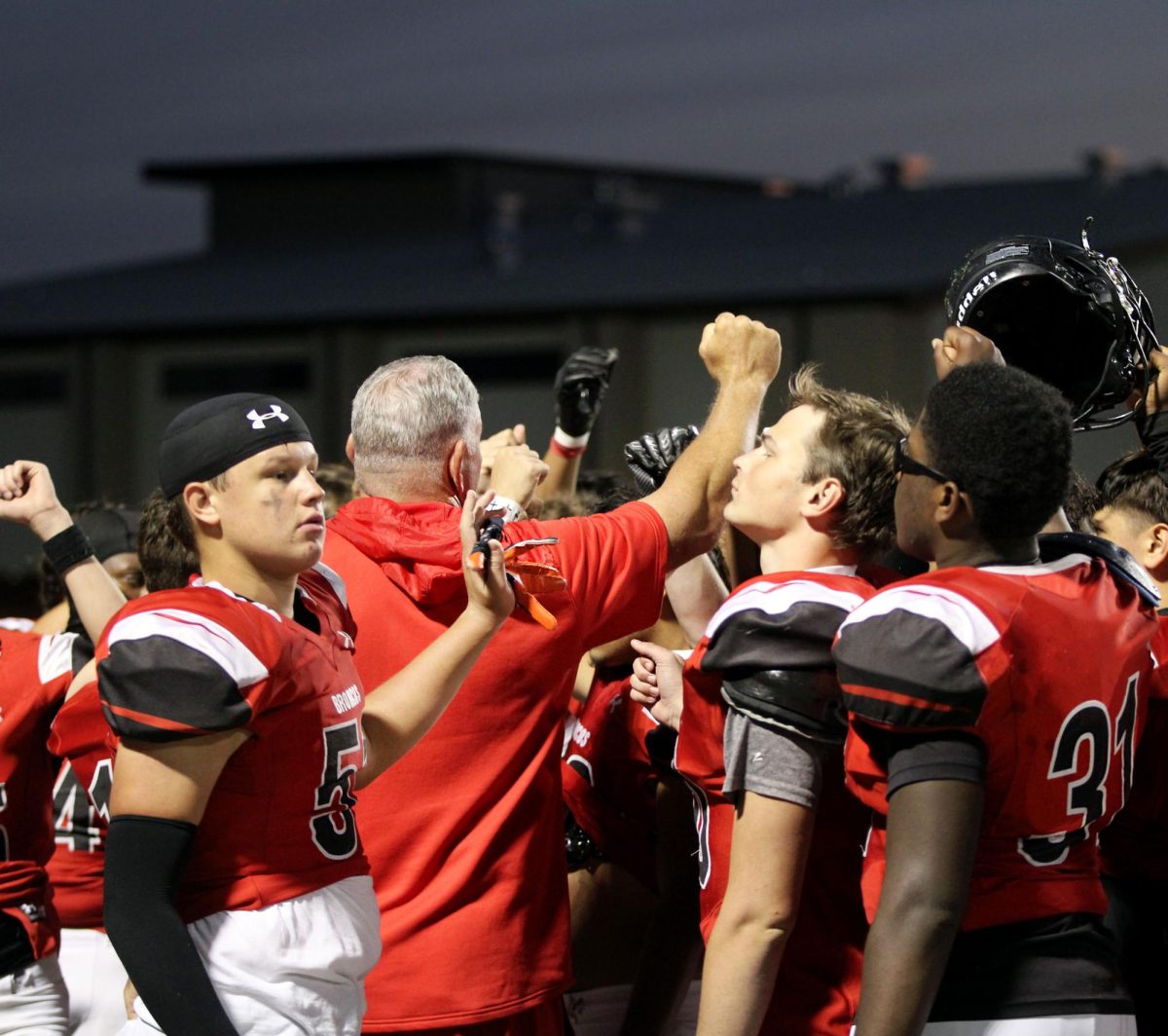A small group of MISD students and alumni including Mireya Martinez, Derrick Odom, Hayle Cobb, Brent West and Chase Tremaine, through both determination and force, managed to attain the coveted center spot in front of the stage. A long wait had preceded entry into the Dallas music venue called The Prophet Bar, with two large lines of young adults wrapping all the way around the ends of the premises. Anticipation was heavy; every ticket had sold out online a few hours before showtime. The dimly lit room constantly increased in fullness, with many eager music fans crowding around the merchandise tables to make a purchase from an array of T-shirts, jackets, posters, bags, CD’s and even vinyls.
However, an air of calmness was also present. Members of all the bands freely walked around to converse with fans. Kenny Vasoli and Ace Enders (who found fame singing for the bands The Starting Line and The Early November, respectively) led the sales for their current projects, Person L and I Can Make a Mess Like Nobody’s Business. In the past, these musicians had been emo idols who headlined their own tours. Now, they were just friends who wanted to talk with their fans and support the main act of the night. In a few hours, this headlining band would perform their last show ever in Dallas, Texas.
The opening act, Deas Vail, played six songs of ethereal indie rock, employing multiple vocalists, two keyboardists, and a talented lead guitarist in order to surround the audience with an array of ambient sounds. Next came Person L, a basic rock n roll act who stood out with two percussionists and the mad dancing around the stage from Vasoli, who sang, screamed, and played raging southern guitar solos with passion. I Can Make a Mess slowed the pace down, with a trio performing sweet piano tunes with a southern twang. And then the crowd waited.
And waited.
Soon, out from the curtains came the final troupe of musicians, led by songwriter Aaron Marsh. The band, Copeland, picked up their instruments, tuned up, and immediately jumped into playing the opening song to the first sold out show of their Farewell Tour. That song, the energizing “Take Care,” comes from the first of the band’s four albums, and it’s a song a share of Copeland fans recall as their first favorite. Here, Marsh played his electric guitar, but he would soon move on to playing his staple instrument, the grand piano sitting behind him. Also behind Marsh played a stellar group of musicians, solidly filling the musical spectrum for Marsh’s songs. Jonathan Bucklew held down the drums, never overbearing the other musicians but adding in supremely-performed drum fills at the most tasteful of moments. Holding down the guitar and bass were the Laurenson brothers Bryan and Stephen, who clearly used their brotherhood as the basis for their steel-strong cohesiveness and chemistry.
However, few fans in the crowd payed as much attention to these great musicians as was deserved. All eyes were on Marsh, who used a visible emotional drive to sing his songs to these fans for the last time, songs that had been written over the past eight years and adored by many more people than just the devotees currently in the room. A bittersweet presence made Marsh’s already deeply emotional and saddening songs even more powerful. For the next forty minutes, the band spent most of their time playing songs from the band’s latest two albums, Eat Sleep Repeat and You Are My Sunshine. Favorites included “I’m a Sucker for A Kind Word,” “Chin Up,” and “The Day I Lost My Voice (The Suitcase Song),” a particularly memorable tune where the aroused crowd sang back refrains with conviction. “I’ve got my life in a suitcase, I’m ready to run run run away, I’ve got no time ’cause I’m always trying to run run run away, a suitcase, a suitcase, a suitcase…”
Interjected into these eight newer songs was one of the band’s oldest songs ever, the light love song “Coffee,” whose sweetly nostalgic timbre foreshadowed the last four songs of the fourteen-song set. “Pin Your Wings” was the closest Copeland ever came to a hit single with its singalong chorus, “No One Really Wins” holds an important place in people’s brains as the iconic opening track they loved upon first hearing Copeland’s sophomore record In Motion, “When Paula Sparks” slowed the pace with one of the band’s most somber tunes, and ending the set was “California,” the emotive lovelorn song about a love torn away by distance. And this was a distance that would soon be placed in between Marsh and his dedicated fans. After this song, Marsh left the stage.
The crowd only had a few moments to applaud until cries for an encore rose above the claps. “Encore, encore, encore!” “One more song, one more song!” “Five more songs!” Yells rang out from all across the filled venue. Minutes passed with no movement onstage. The crowd persisted. A few more minutes passed, and a lone man came out from behind the curtains. Aaron Marsh picked up his guitar to start the encore. However, Marsh seemed to be having a lot of trouble tuning his guitar. Noticing the opportunity, fans in the crowd began to exclaim questions they had for the singer.
“Oh, so this is a Q&A?” Marsh asked. “Alright.”
“Why are you breaking up?” one fan asked from the middle of the crowd.
“Because we’re getting too old to sleep in a van every night together,” Marsh answered with a smirk.
The next question came from Tremaine in the small group of MISD students in the front, yelling, “Are you going to focus on producing?”
“I will be producing records,” Marsh said. The crowd erupted in cheers. “Wow, I thought I was the only one excited about this. Thanks!” After this, the guitar was finally tuned. Fingers forming an A minor chord, Marsh began to strum a lonely and despairing version of what’s possibly the most sadly romantic, and personally beloved, songs in all of Copeland’s arsenal. This rendition of “Love Affair” was weak and penetrable, quiet and heartfelt.
Following in suit, the next song was the song that changed the lives of many die-hard fans, “Brightest.” For this song, Laurenson returned to the stage to add some extra guitar ambience. Soft and sweet, the song resonated over the listeners with both sadness and bittersweet triumph. Many in the crowd would have felt cheated if they left that night without hearing this song, but the song was a also a clear signal the night was over. Most crowd members would never see this band perform ever again. Chills ran across spines.
Then the other two band members returned to the stage for one last surprise. As all eyes were on Marsh for his swan song, the energy rose for the end-all of finales, “You Have My Attention.” As the fans sang “you have my attention” back to Marsh, they certainly weren’t lying. Three minutes of emotion, three minutes of driving guitars, three minutes of impassioned singing from across the room were all that remained until the evening ended. Slowly, the attendants drifted away into the midnight air, contemplating and reliving the moments they had just shared with one another. Copeland may have not changed the world, but they certainly changed a few lives. And for these few hundred people, who would continue to go on living their lives as the life of Copeland would end, this night would surely not be forgotten.







